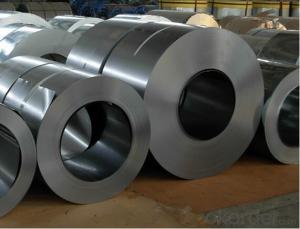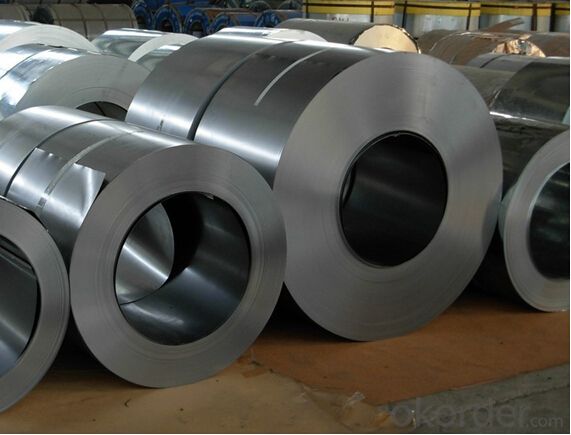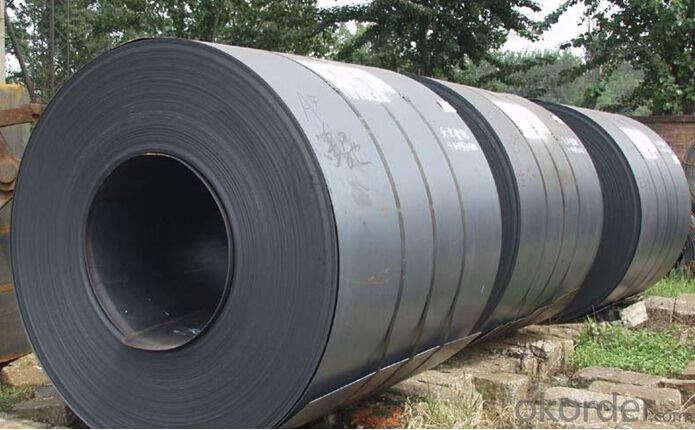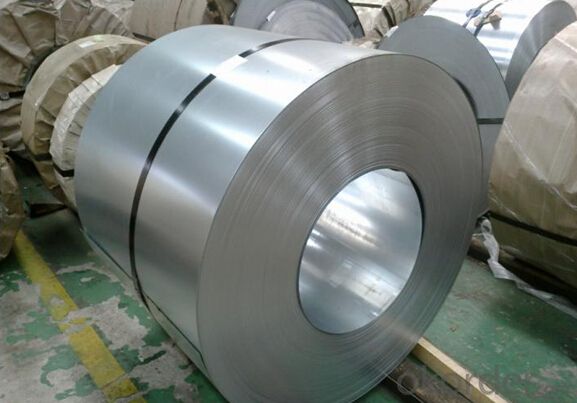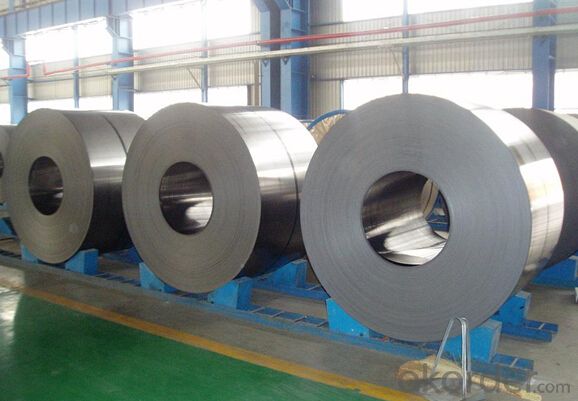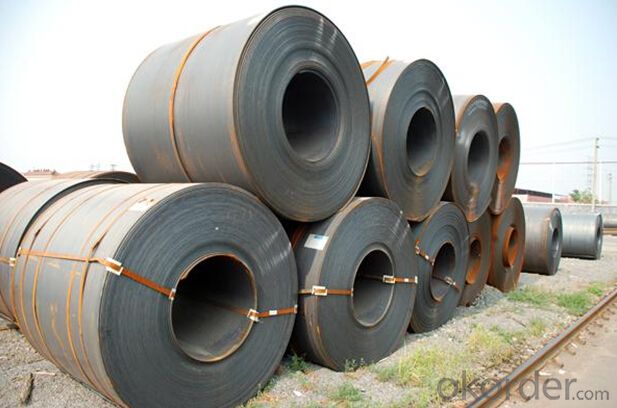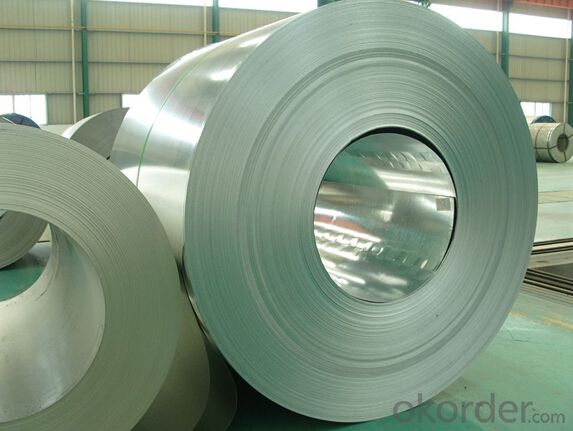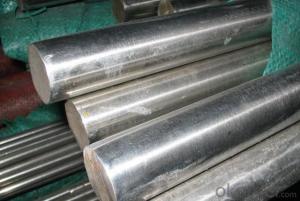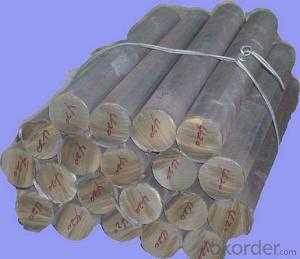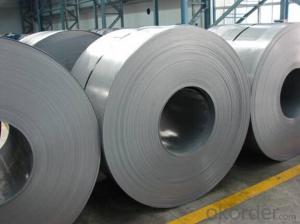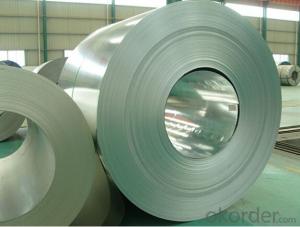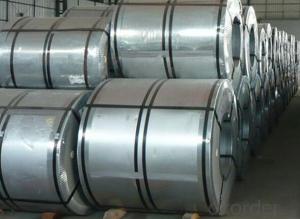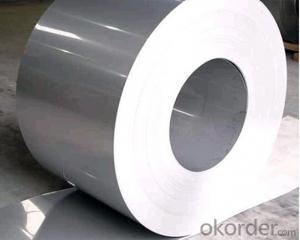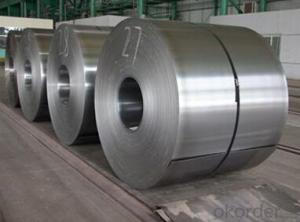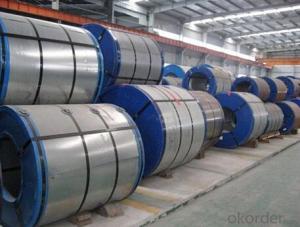Grade JIS G3135-SPFC 390 Galvanized Steel Coil
- Loading Port:
- Tianjin
- Payment Terms:
- TT OR LC
- Min Order Qty:
- 3 m.t.
- Supply Capability:
- 10000 m.t./month
OKorder Service Pledge
OKorder Financial Service
You Might Also Like
Specification
Grade JIS G3135-SPFC 390 Galvanized Steel Coil
Specification of Grade JIS G3135-SPFC 390Galvanized Steel Coil
1. Galvanized Steel Coil
(1) Width: 600-1570mm
(2) Thickness: 0.13-5.0mm
(3) Grade: JIS G3302-SGCC-SGC570, SGCH (full hard-G550), SGHC-SGH540
EN10346-DX51D+Z, DX53D+Z, S250GD-S550GD
ASTM A653-CS-B, SS255-SS550
(4) Zinc Coating: Z40g/m2~Z500g/m2 (both side total coating thickness)
2. Galvalume Steel Coil
(1) Width: 600~1500mm
(2) Thickness: 0.15~2.30mm
(3) Grade: JIS G3321-SGLCC, SGLC400-570, (G550)
EN10346-DX51D+AZ, DX53D+AZ, S250-S550
ASTM A792M CS-B, SS255-SS550
(4) AZ Coating: AZ50~AZ185g/m2
3. Prepainted Galvanized Steel Coil (PPGI)
(1) Width: 600~1250mm
(2) Thickness: 0.19~1.50mm
(3) Grade: JIS G3312-CGCC, CGC340-570, (G550)
ASTM A755M CS-B, SS255-SS550
(4) Zinc Coating: Z40g/m2~Z500g/m2 (both side total coating thickness)
4. Prepainted Galvanized Steel Coil (PPGL)
(1) Width: 600~1250mm
(2) Thickness: 0.20~1.50mm
(3) Grade: JIS G3322-CGLCC, CGLC340-570, (G550)
ASTM A755M CS-B, SS255-SS550
(4) AZ Coating: AZ50~AZ185g/m2 (both side total coating thickness)
5. Cold Rolled Steel Coil (Soft) (for further information, pls click the product name)
(1) Width: 600~1570mm
(2) Thickness: 0.13~2.50mm
(3) Grade: JIS G3141-SPCC-SD, SPCD-SD, SPEC-SD
JIS G3135-SPFC 340/390/440
EN10130-DC01, DC03, DC04
SAE1006, SAE1008
ASTM A424-TypeⅡ
6. Cold Rolled Steel Coil (Full Hard) (for further information, pls click the product name)
(1) Width: 600~1570mm
(2) Thickness: 0.13~2.50mm
(3) Grade: JIS G3141-SPCC-1B, SPCC-1D
7. Hot Rolled Steel Coil
(1) Width: 1000~1524mm
(2) Thickness: 1.20~16.5mm, other thickness can be negotiation
(3) Grade: JIS G3101-SS400, JIS G3132-SPHT1/2/3, ASTM A36, Q195, Q235 etc.
Company Introduction of the Grade JIS G3135-SPFC 390 Galvanized Steel Coil
CNBM International Corporation is the most import and export platform of CNBM group(China National Building Material Group Corporation) ,which is a state-owned enterprise, ranked in 270th of Fortune Global 500 in 2015.
With its advantages, CNBM International are mainly concentrate on Cement, Glass, Iron and Steel, Ceramics industries and devotes herself for supplying high quality series of refractories as well as technical consultancies and logistics solution.
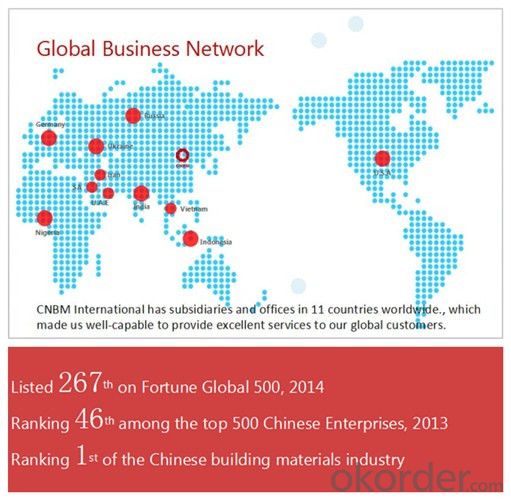
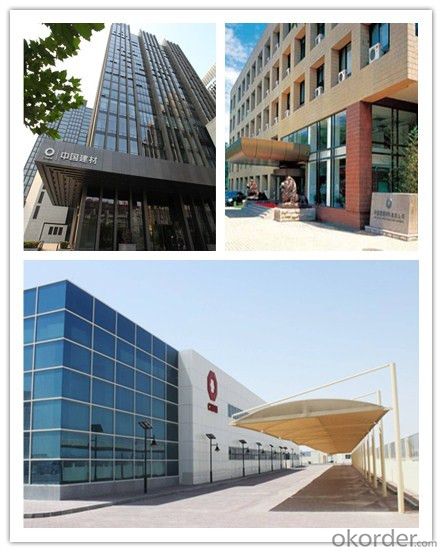
Packaging & Delivery of the Grade JIS G3135-SPFC 390 Galvanized Steel Coil
Packaging Detail | Sea worthy packing /as per customer's packing instruction |
Delivery Detail | 15 ~ 40 days after receiving the deposit |
Products Show:
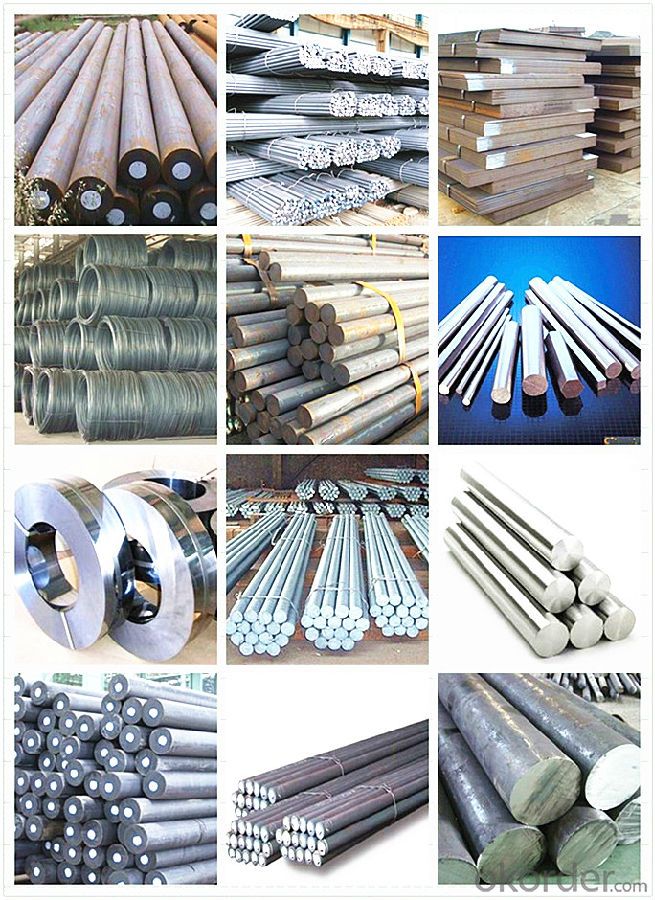
FAQ:
Are you a trading company or manufacturer? | Manufacturer |
What’s the MOQ? | 3 metric ton |
What’s your delivery time? | 15-35 days after downpayment received |
Do you Accept OEM service? | Yes |
what’s your delivery terms? | FOB/CFR/CIF |
What's the Payment Terms? | 30% as deposit,70% before shipment by T/T |
Western Union acceptable for small amount. | |
L/C acceptable for large amount. | |
Scrow ,Paybal,Alipay are also ok | |
Why choose us? | Chose happens because of quality, then price, We can give you both. Additionally, we can also offer professional products inquiry, products knowledge train (for agents), smooth goods delivery, excellent customer solution proposals. |
What's your available port of Shipment? | Main Port, China |
What’s your featured services? | Our service formula: good quality+ good price+ good service=customer's trust
|
Where are your Market? | Covering more than 160 countries in the world |
- Q: What is the importance of heat treatment in special steel?
- The significance of heat treatment in special steel cannot be emphasized enough as it greatly enhances its mechanical properties and overall performance. Special steel, also known as alloy steel, is specifically engineered to possess certain characteristics such as high strength, hardness, wear resistance, and toughness, making it suitable for challenging applications in industries like automotive, aerospace, and tooling. The process of heat treatment involves controlled heating and cooling of the steel in order to modify its microstructure, which subsequently impacts its properties. There are various heat treatment techniques employed, including annealing, tempering, quenching, and hardening, each serving a distinct purpose. One crucial aspect of heat treatment in special steel is its ability to enhance hardness. Through techniques like quenching and hardening, the steel can be transformed into a hardened state, making it significantly stronger and more resistant to abrasion and wear. This is of utmost importance for applications involving heavy loads, impact, and abrasive environments. Furthermore, heat treatment can also enhance the toughness and ductility of special steel. By precisely controlling the cooling rate during the heat treatment process, the microstructure of the steel can be adjusted to achieve a fine-grained structure, thereby improving its ability to withstand sudden impacts or shocks. This is particularly critical in applications where the material needs to absorb energy and resist fractures, such as in structural components or tools. Moreover, heat treatment can also improve the machinability and dimensional stability of special steel. By subjecting the steel to annealing or tempering processes, internal stresses and residual strains can be relieved, resulting in a more stable and easier-to-machine material. This is indispensable in industries where precision and dimensional accuracy are of utmost importance. In conclusion, the significance of heat treatment in special steel cannot be overstated. It is a vital process that enables the optimization of the steel's mechanical properties, ensuring that it fulfills the specific requirements of demanding applications. By skillfully manipulating the microstructure, heat treatment enhances the steel's hardness, toughness, and machinability, making it a versatile and dependable material in various industries.
- Q: What are the future prospects for the special steel industry?
- The future prospects for the special steel industry are promising. With advancements in technology, increasing demand for high-performance materials in various sectors such as automotive, aerospace, and construction, the special steel industry is expected to witness steady growth. Additionally, the shift towards sustainable and lightweight materials in industries like renewable energy and electric vehicles presents new opportunities for the special steel industry. However, the industry may face challenges in terms of environmental regulations and competition from alternative materials. Overall, the future outlook for the special steel industry looks favorable, driven by technological advancements and evolving market demands.
- Q: How does special steel contribute to the longevity of products?
- There are several ways in which special steel contributes to the longevity of products. To begin with, its exceptional strength and durability are well-known. Special steel is specifically designed to endure extreme conditions, such as high temperatures, pressure, and corrosive environments. This makes it highly suitable for use in various industries, including aerospace, automotive, and construction. The remarkable strength of special steel enables products to bear heavy loads and resist deformation, ensuring they remain intact and functional for a prolonged period of time. For example, in the construction industry, special steel is frequently employed in structural components like beams and columns, which provide crucial support and stability to buildings over many years. Furthermore, special steel possesses excellent resistance to wear and abrasion. It can endure constant friction, impact, and contact with other materials without significant deterioration. This characteristic is vital in industries where products are subjected to continuous use, such as machinery, tools, and equipment. The utilization of special steel in these applications guarantees that the products remain in good working condition for an extended period, reducing the need for frequent repairs or replacements. Additionally, special steel exhibits exceptional resistance to corrosion, making it highly resistant to rust and other forms of corrosion. This property is especially advantageous in products exposed to harsh environments or chemicals, like marine vessels, pipelines, and chemical processing equipment. Through the utilization of special steel, manufacturers can significantly prolong the lifespan of these products, minimizing the risk of failure or breakdown due to corrosion. In conclusion, special steel contributes to the longevity of products through its provision of superior strength, durability, wear resistance, and corrosion resistance. Its extraordinary properties enable products to withstand harsh conditions, heavy loads, and continuous use, guaranteeing that they remain functional and reliable for an extended period. By incorporating special steel into their designs, manufacturers can greatly enhance the lifespan of their products, leading to cost savings, improved reliability, and customer satisfaction.
- Q: How does special steel perform in extreme cold temperatures?
- Special steel performs well in extreme cold temperatures due to its high strength and resistance to brittleness. It retains its mechanical properties, such as toughness and ductility, which allows it to withstand low temperatures without cracking or breaking. Additionally, special steel often possesses low thermal conductivity, which helps it maintain its structural integrity and prevents it from becoming brittle in extremely cold environments.
- Q: How does special steel contribute to the food processing aftermarket industry?
- Special steel plays a crucial role in the food processing aftermarket industry by providing equipment and components that ensure safety, efficiency, and durability. With its exceptional properties such as corrosion resistance, high strength, and heat resistance, special steel is used to manufacture cutting blades, sieves, conveyors, and other machinery parts. This allows for precise cutting, sieving, and conveying of various food products, maintaining their quality and reducing contamination risks. Overall, special steel enhances the performance and longevity of food processing equipment, enabling the industry to meet stringent hygiene standards and increase productivity.
- Q: What are the main characteristics of magnetic steel forgings?
- Magnetic steel forgings possess a multitude of desirable traits that make them highly sought after in numerous industries. Firstly, their exceptional magnetic properties allow for easy magnetization and demagnetization. This renders them suitable for applications that require magnetism, such as electrical motors and generators. Secondly, magnetic steel forgings exhibit remarkable strength and durability. Through the forging process, the steel is compressed and shaped, resulting in a dense and uniform microstructure. This greatly enhances the mechanical properties of the steel, including tensile strength, impact resistance, and fatigue strength. As a result, magnetic steel forgings can withstand heavy loads and harsh operating conditions, making them ideal for demanding applications like automotive components, industrial machinery, and aerospace parts. An additional characteristic of magnetic steel forgings is their exceptional corrosion resistance. The forging process aids in refining the grain structure of the steel, reducing its susceptibility to corrosion and oxidation. This quality is crucial in industries where components are exposed to corrosive environments or high temperatures, such as marine applications or oil and gas equipment. Furthermore, magnetic steel forgings offer excellent machinability and weldability. The forging process not only enhances the mechanical properties of the steel but also improves its machinability, allowing for easy shaping and modification into intricate designs. Additionally, magnetic steel forgings can be readily welded without compromising their integrity, providing flexibility in manufacturing and assembly processes. Lastly, magnetic steel forgings exhibit exceptional dimensional stability. The forging process involves controlled heating and cooling, minimizing dimensional changes and distortions. This ensures that the final product maintains its shape and dimensions, enabling precise fit and compatibility with other components. In summary, magnetic steel forgings possess excellent magnetic properties, high strength and durability, corrosion resistance, good machinability and weldability, and dimensional stability. These characteristics contribute to their versatility and widespread use in various industries, leading to their overall success and popularity.
- Q: How does special steel contribute to the transportation industry?
- Special steel plays a crucial role in the transportation industry by providing strength, durability, and reliability to various components and structures. It is used in the construction of vehicle bodies, engines, chassis, and suspension systems, ensuring safety and longevity. Additionally, special steel's high resistance to corrosion and fatigue helps extend the lifespan of transportation equipment, reducing maintenance costs and enhancing efficiency. Overall, special steel enhances the performance, efficiency, and safety of vehicles, making it an invaluable material in the transportation industry.
- Q: What are the different methods of improving the wear resistance of special steel?
- There are several methods of improving the wear resistance of special steel. One common method is through heat treatment, which involves heating and cooling the steel to modify its microstructure and improve hardness. Another method is through alloying, where different elements are added to the steel to enhance its wear resistance properties. Additionally, surface treatments like nitriding, carburizing, and coating can also be employed to improve wear resistance. Overall, a combination of these methods can significantly enhance the wear resistance of special steel.
- Q: How does special steel contribute to the power generation sector?
- Special steel plays a crucial role in the power generation sector by offering various benefits and contributing to the overall efficiency and reliability of power generation equipment. One of the primary ways special steel contributes is through its superior strength and durability. Power generation involves highly demanding and extreme conditions, including high temperatures, pressure, and corrosive environments. Special steel is specially designed to withstand these harsh conditions and maintain its structural integrity, ensuring the long-term reliability and safety of power generation equipment. Special steel is used in various components of power generation equipment, such as turbines, boilers, and generators. In gas turbines, for example, special steel is utilized for the construction of turbine blades and vanes, which are subjected to immense heat and rotational forces. The high-temperature resistance and strength of special steel allow these components to operate at elevated temperatures without deformation or failure, thereby increasing the efficiency and performance of gas turbines. Moreover, special steel offers excellent corrosion resistance, making it suitable for use in power plants that utilize water-based cooling systems. These cooling systems often employ seawater or chemically treated water, which can be highly corrosive. By using special steel in critical components like condensers and heat exchangers, the power generation sector can significantly reduce maintenance and replacement costs associated with corrosion-related issues. Additionally, special steel is crucial in the construction of nuclear power plants. It is used in the fabrication of reactor pressure vessels, steam generators, and fuel assemblies. The radiation resistance and high strength of special steel ensure the safety and reliability of these components in nuclear power plants, thereby contributing to the overall efficiency and sustainability of the power generation sector. In summary, special steel's superior strength, high-temperature resistance, corrosion resistance, and radiation resistance make it an indispensable material in the power generation sector. It enhances the efficiency, reliability, and safety of power generation equipment, ultimately contributing to the overall growth and sustainability of the power generation industry.
- Q: Can special steel be used in the production of musical instruments?
- Musical instruments can indeed benefit from the use of special steel. This type of steel, also known as tool steel or high-performance steel, has been specifically engineered to possess certain characteristics that make it suitable for specific applications. These characteristics include exceptional strength, durability, and resistance to both wear and corrosion. When it comes to musical instruments, special steel can be utilized in various components such as strings, springs, keys, valves, and reeds. For instance, piano strings are typically crafted from high-carbon steel, which provides the necessary strength and elasticity to produce the desired sound. Brass instruments like trumpets or saxophones have valves made from special steel alloys, which possess excellent corrosion resistance and can endure the repetitive movements required during play. Furthermore, special steel can also be employed in the production of instrument parts like guitar frets. Frets are metal strips embedded along the guitar's fingerboard, and they must be constructed from a material that is durable, wear-resistant, and able to maintain its shape over time. Special steel alloys, such as stainless steel or nickel-silver, are commonly chosen for this purpose. In summary, special steel brings forth a variety of properties that can improve the performance and longevity of musical instruments. With the utilization of this type of steel, manufacturers can create instruments that produce high-quality sound, withstand wear and tear more effectively, and enjoy a longer lifespan.
Send your message to us
Grade JIS G3135-SPFC 390 Galvanized Steel Coil
- Loading Port:
- Tianjin
- Payment Terms:
- TT OR LC
- Min Order Qty:
- 3 m.t.
- Supply Capability:
- 10000 m.t./month
OKorder Service Pledge
OKorder Financial Service
Similar products
Hot products
Hot Searches
Related keywords
